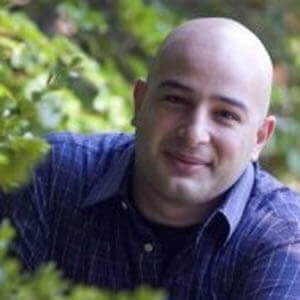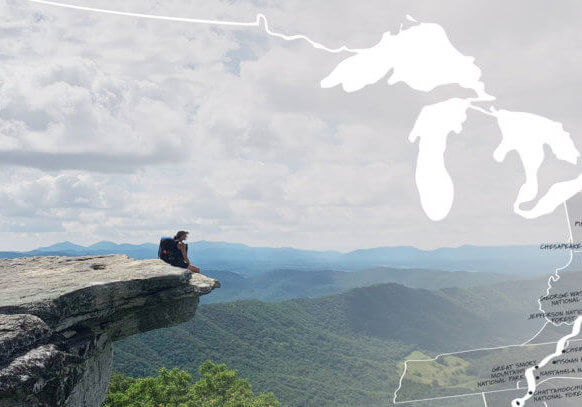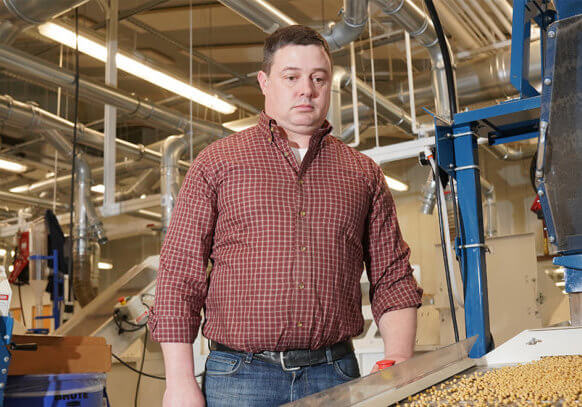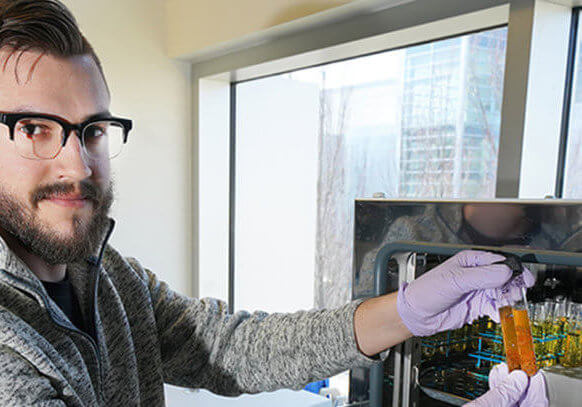A
Purdue University scientist is looking for farmers to participate in two projects aimed at improving fertilizer and seeding rates in a variety of crops. Davide Cammarano, an associate professor of agronomy, will utilize remote sensing and data science to maximize on-farm profits while minimizing environmental risk.
The first project, a collaborative effort between the University of Minnesota and Purdue, seeks Indiana and Minnesota farmers willing to test a series of precision nitrogen management practices. They’ll be asked to apply various rates of nitrogen in strips prior to planting corn. Researchers will later capture satellite or aerial images of the fields and use that data to develop variable rate prescriptions for nitrogen sidedress applications.
Today, only 20 percent of Midwest farmers practice precision nitrogen management on their farms. The findings will help Cammarano and colleagues determine the application rates that provide the most agronomic, economic and environmental benefits for a wide variety of on-farm conditions, allowing more farmers to adopt precision nitrogen strategies with confidence.

“The data we collect here will help us develop plans for applying nitrogen in specific situations and for specific crops,” said Cammarano, whose expertise includes crop modeling, remote sensing and precision agriculture. “We are harnessing digital agriculture tools to provide the most benefit for the growers and the environment.”
The researchers are looking for a total of 10 fields, no less than 30 acres in size, in counties that vary in vulnerability for nitrate contamination of groundwater. Those would be in Jasper, Cass, Miami, Carroll, Blackford, Henry, Hendricks, Shelby, Dubois and Vanderburgh counties in Indiana.
Farmers should be eligible for the Environmental Quality Incentive Program (EQUIP) and have a crop advisor willing to cooperate with the project. Those who have management records, including fertilizer application maps, planting maps, yield maps and soil sampling data for the last eight to 10 years, are preferred.
Farmers who collaborate in the on-farm research will receive $1,000 and will be compensated for any yield loss. Crop advisors will receive $300 per field.
The second collaborative project, led by the University of Illinois, seeks cotton, corn, soybean and wheat producers from Indiana, Arkansas, Idaho, Illinois, Louisiana, Texas, Michigan, Minnesota, Montana, Nebraska, North Dakota, Ohio, South Dakota, and Washington to improve fertilizer and seed management strategies.
Researchers will offer farmers tools they can use to conduct site-specific, data-driven evaluations of the economic and environmental impacts of specific nitrogen, phosphorus and seed-rate management strategies.
“We are looking for opportunities for growers to get the most efficiency possible in seeding rates and fertilizer application,” Cammarano said. “If we can find the sweet spot of getting the maximum yield with the least amount of fertilizer, we realize not only an economic benefit, but an environmental one as well.”
For more information on the field trials or to participate, email Cammarano at dcammar@purdue.edu.
Conquering the Trail
Purdue Forestry and Natural Resources (FNR) alumnae Rebekah Lumkes and Baleigh Haynes joined an elite group of individuals, completing a 2,192 mile thru-hike of the Appalachian Trail. For one, it was the culmination of a college pipedream. For the other, it offered a much-needed life reset. Here is their story.
Read Full Story >>>Behind the Research: Jason Adams
Jason Adams starts each workday by checking the Indiana Corn and Soybean Innovation Center (ICSC) physical plant and the equipment that researchers have reserved for the day. “I’m an equipment junkie, and Purdue has given me a lot to take care of,” he says.
Read Full Story >>>Graduate researcher makes the most of fungi
Ethan Hillman likens his arrival at Purdue to speed dating. Hillman, who chose the Purdue Interdisciplinary Life Science (PULSe) program for graduate study, rotated through multiple labs, looking to find the right match for the next five years.
Read Full Story >>>Conquering the Trail
Purdue Forestry and Natural Resources (FNR) alumnae Rebekah Lumkes and Baleigh Haynes joined an elite group of individuals, completing a 2,192 mile thru-hike of the Appalachian Trail. For one, it was the culmination of a college pipedream. For the other, it offered a much-needed life reset. Here is their story.
Read Full Story >>>Behind the Research: Jason Adams
Jason Adams starts each workday by checking the Indiana Corn and Soybean Innovation Center (ICSC) physical plant and the equipment that researchers have reserved for the day. “I’m an equipment junkie, and Purdue has given me a lot to take care of,” he says.
Read Full Story >>>Graduate researcher makes the most of fungi
Ethan Hillman likens his arrival at Purdue to speed dating. Hillman, who chose the Purdue Interdisciplinary Life Science (PULSe) program for graduate study, rotated through multiple labs, looking to find the right match for the next five years.
Read Full Story >>>

